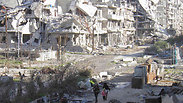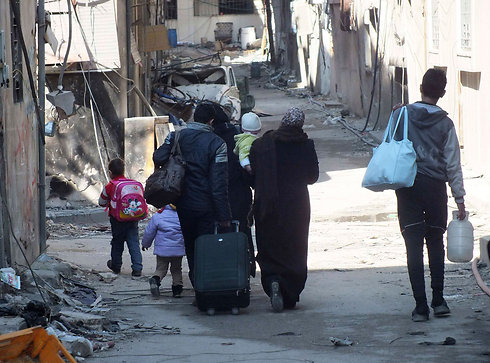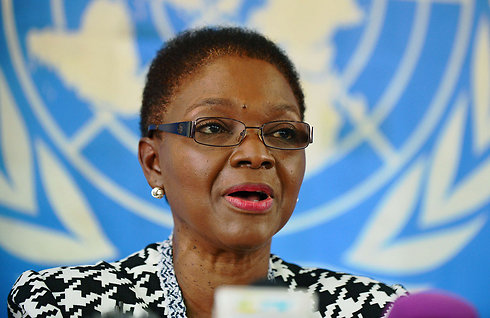
Escaping the siege: Hundreds evacuated from Homs
After more than year-long blockade, some 1000 people evacuated from Syria city since weekend as part of temporary cease-fire
Three hundred people were evacuated on Monday from the Old City of Homs, the Syrian Red Crescent said, as humanitarian operations in the besieged rebel-held area continued into a fourth day, after a UN-brokered cease-fire in the city was renewed for three more days Monday.
Monday's evacuation means that around 1,000 people have now left the Old City, where rebels fighting to overthrow President Bashar al-Assad have been surrounded for more than a year by his forces.
Related stories:
- UN aid to enter Syria's Homs after initial evacuations
- Deal on women, children in besieged Syrian city
- Syria parties discuss aid to Homs; prisoners on Sunday agenda
The UN truce, which began Friday, has been shaken by continued shelling and shooting that prevented some residents from escaping and limited food aid officials have been able to deliver into the besieged neighborhoods. The UN humanitarian chief Valerie Amos sharply criticized the two sides, saying UN and Syrian Red Crescent workers in the operation were "deliberately targeted."
The drama in Homs played out as activists on Monday reported new sectarian killings in Syria's civil war.
Al-Qaida-inspired rebels killed more than two dozen civilians, including an entire family, when they overran a village populated by minority Alawites on Sunday, Rami Abdurrahman of the British-based Syrian Observatory for Human Rights said. They also killed around 20 local fighters in the village, he said.
The violence further rattled peace talks that entered their second round Monday in Geneva – and which quickly became mired in recriminations between the government of President Bashar Assad and the opposition in exile.
The two sides' first face-to-face meetings adjourned 10 days ago having achieved little. This time, the two appeared even farther apart – with no immediate plans to even sit at the same table. UN-Arab League envoy Lakhdar Brahimi was holding separate talks with each side.
"The negotiations cannot continue while the regime is stepping up its violence against the Syrian people," opposition spokesman Louay Safi told reporters after talks with Brahimi. The opposition insists the talks' aim is to agree on a transitional governing body that would replace Assad.
The aid operation in Homs laid bare the desperation in the besieged areas. Homs, in central Syria, was one of the first cities to rise up against Assad's rule, and while government forces have retaken much of the city, several rebel-held districts in its historic old center have been under a suffocating siege for more than a year.
Many of those evacuated since Friday "were traumatized and weak," Amos said in a statement. They reported "terrible conditions at the field hospital in the Old City, where the equipment is basic, there are no medicines and people are in urgent need of medical attention," she said.
Amos said the truce had been extended for three days. The original truce ran from Friday to Sunday, but the continued shelling and shooting between the two sides severely limited efforts. Eleven people were killed by the fighting.
Over the weekend, some women and elderly tried to leave but were unable to make their way through checkpoints to evacuation buses, according to Khaled Erksoussi, the head of operations of the Syrian Red Crescent.
He said and some food aid was brought into the areas over the weekend – "but not the quantity we had hoped for" – and none made it in on Monday.
On Sunday, residents rushed through gunfire to reach the UN vehicles bringing food that did make it in. Then they fought over the oil, sugar and other supplies, according to one activist in Homs who uses the nickname Eman al-Homsy for security reasons.
"They didn't care about death, the hunger was killing them," said Eman.
Around a quarter million people in 40 districts besieged by government forces have been cut off from humanitarian aid for months, said Ertharin Cousin, the UN's World Food Program's executive director.
In the Yarmouk area, on Damascus' southern fringe, activists estimate over 100 people have died from hunger-related illness and a lack of medical aid, because of a year-long blockade.
Reuters contributed to this report.












